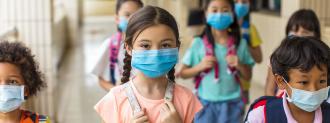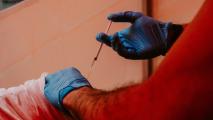Surprising new research out of Yale — published in PNAS — suggests that asthma and allergies may actually have a beneficial impact for children when it comes to COVID-19.
Both conditions lead to increased production of immune cells called eosinophils. The presence of more eosinophils reduces the expression of ACE2, the favorite target of the spike protein, a key coronavirus protein that SARS-CoV-2 uses to enter human cells.
“Initially, there was a concern about the impact of COVID-19 on children with asthma,” says Naftali Kaminski, study author and chief of pulmonary, critical care, and sleep medicine at Yale School of Medicine.
“But, in fact, it seems that compared to other chronic lung diseases, people with asthma are infected less, and, when they are infected, asthma is not a risk factor.”
But… It’s Never Quite That Simple
You’d think that a virus that attacks the respiratory system should be extra dangerous to those whose lungs are already compromised, and a respiratory virus should also be unusually dangerous to children.
But the impact of SARS-CoV-2 on asthmatics — and the lack of severe complications for kids — muddies the conventional wisdom.
An analysis of 1,526 patients across the Northwestern Medicine system published in The Journal of Allergy and Clinical Immunology found that patients with asthma were no more likely to be hospitalized than those without.
“I was expecting asthma patients to possibly fare worse (with COVID-19),” Gayatri Patel, the study’s co-author and an allergy and immunology fellow at Northwestern, told STAT. “So what was surprising was that we actually did not see that.”
But it’s not quite so easy to call: there are multiple kinds of asthma, and they could prove to have different impacts on risk.
Another study, which broke down patients into those whose asthma is induced by allergies and those whose asthma is triggered by weather, exercise, and other non-allergic factors, found that non-allergic asthma “significantly heightened the likelihood of severe COVID-19,” according to STAT.
Allergic asthma seemed to cause no such increase.
A key differentiator, perhaps? Allergic asthma causes the production of those eosinophils.
The eosinophils “dramatically reduce” the amount of ACE2 receptors in the body. By depriving the coronavirus of its favorite target, asthma and allergies could be a key to the less severe relationship between children and COVID-19.
(Potentially bolstering their case? A small study of 85 fatal infections from Wuhan, which found that slightly over 80% of the deceased had “very low” eosinophil counts when they were admitted.)
“Allergic asthma may actually decrease the rate of infection,” Jonathan Spergel, chief of the Allergy Program at Children’s Hospital of Philadelphia, told STAT. According to Spergel, allergic asthma accounts for the majority of pediatric asthma cases, another potential piece of the puzzle.
The Cold Water
The good news is tempered, however, but how much we still don’t know about this pandemic.
The correlations here are encouraging, but there still isn’t rigorous proof that asthma and allergies causally reduce the severity of COVID-19. And however common they may be in kids, they can’t explain all of the difference in severity between kids and older adults: even kids without allergies don’t tend to have bad cases of coronavirus.
As with so many other things about COVID-19, more and better research is needed to understand the relationship between asthma, allergies, kids, and COVID-19. Other factors may explain the reduced severity in kids, including greater exposure to common cold, other respiratory viruses, and childhood vaccinations.






